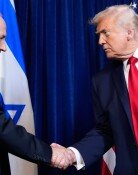Lee Jae-myung chosen as Democratic Party nominee
Lee Jae-myung chosen as Democratic Party nominee
Posted April. 28, 2025 07:50,
Updated April. 28, 2025 07:50
Lee Jae-myung, a former leader of South Korea’s Democratic Party, secured the party’s nomination for the upcoming presidential election on Saturday, winning an overwhelming 89.77% of the vote.
The result combined four rounds of regional voting by party members and delegates with a public opinion poll among Democratic Party supporters and moderates, each weighted equally.
It will be Lee’s second bid for the presidency following his defeat in the 2022 election. In his acceptance speech, Lee said his nomination reflected a public desire for “democracy and human rights, peace and security, recovery and growth, unity and happiness.” He promised to “close the door on an era marred by inequality, despair, conflict and division, and open a new chapter filled with hope, love and national unity.”
Lee’s sweeping victory left no serious rival. His commanding lead in opinion polls, along with the strengthened control he gained over the party during his tenure as chairman, fueled his momentum. But despite the appearance of smooth sailing, Lee faces significant hurdles — starting with doubts about his trustworthiness.
Traditionally a progressive, Lee has pivoted toward the center-right in recent months, calling for a greater focus on economic growth. Yet many voters question whether he will follow through. While promoting corporate-led growth, he is also pushing legislative reforms that would impose stricter regulations on businesses. He continues to advocate for a universal basic income, insisting he has “not given up” on the idea. These conflicting messages have sown confusion among voters. Lee, for his part, has expressed frustration, saying, “Even when I pledge not to engage in political retaliation, people don't believe me.”
Another looming concern is the potential for unchecked political dominance. The Democratic Party was often criticized for ramming legislation through the National Assembly without bipartisan support. Although former President Yoon Suk Yeol’s disregard for the opposition exacerbated tensions, critics say the Democratic Party has shown little willingness to compromise. If Lee wins the presidency, the party could dominate the legislative process, as South Korea’s system provides few institutional checks once a single party holds both the executive and a parliamentary majority. With internal dissent almost negligible — as shown by Lee’s near-90% support in the primary — few obstacles remain inside the party.
Ideally, such concerns must have been tested during the Democratic Party’s primary. In a competitive race, rival candidates must have challenged Lee’s positions and leadership style. But with little competition and overwhelming support for Lee, the primary concluded quietly. Meanwhile, the main opposition People Power Party remains mired in internal disputes and failed to mount any meaningful scrutiny.
The Constitutional Court, in its decision to remove Yoon from office, urged the Democratic Party to exercise restraint, dialogue, and compromise. If Lee wins the presidency, calls for restraint will become even more urgent. Lee acknowledged as much in his acceptance speech, pledging to “fulfill the president’s foremost duty of achieving national unity.” Over the next 37 days, Lee must prove himself in order to be entrusted with the nation’s leadership.







